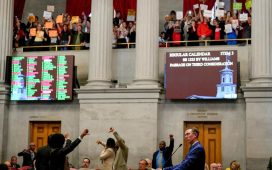Senate Majority Leader Mitch McConnell, with Rep. Andy Barr (left) and Breeders’ Cup president Drew Fleming unveil Horseracing Integrity and Safety Act at Keeneland news conference in September
Attorneys representing three Congressional proponents of the Horseracing Integrity and Safety Act (HISA) have filed an amici curiae brief in support of a motion by defendants to dismiss a federal lawsuit by the National Horsemen’s Benevolent and Protective Association and several affiliates alleging that the federal law establishing national oversight on medication and safety policies for horse racing is unconstitutional.
Attorneys Eric Grant of Texas and Paul E. Salamanca of Kentucky submitted the “friend of the court” brief on behalf of Kentucky Sen. Mitch McConnell, who pushed for the passage of HISA as part of omnibus funding bill in December while serving as Senate majority leader; Kentucky Rep. Andy Barr; and New York Rep. Paul Tonko. Barr and Tonko were the primary sponsors of HISA in the House of Representatives. The bill was signed into law by former President Donald Trump.
The brief pushes back against a partial motion to dismiss from HBPA attorneys filed April 30 seeking the court to declare HISA unconstitutional and order an injunction preventing the Horseracing Integrity and Safety Authority, the agency created by the law, from operating as a national oversight body.
The three points of contention countering the HBPA position is that 1) HISA is vital legislation; 2) HISA is the result of extensive legislative deliberation; and 3) HISA is structurally constitutional.
The brief argues that the racing industry recognized that an “acute safety crisis was creating an existential crisis of public confidence” and that HISA was Congress’ response to that crisis.
“HISA’s mandate to create national, uniform equine health and safety rules is vital to the stability and growth of horseracing,” the brief reads. “Like any regulatory regime, not everyone agrees with HISA’s objectives or the means by which the statute achieves those objectives. But the question for this court is only whether Congress had an adequate and legitimate basis for enacting HiSA.”
On the second point, the brief explains the history of previous efforts to pass legislation similar to HISA, with numerous Congressional hearing taking place over the last decade, including one in 2018 and another in 2020. Among the 14 witnesses who testified in the latter two hearings, the brief contends, were four opponents of the legislation, including the CEO of the National HBPA.
The HBPA alleged in its lawsuit that HISA passed the House of Representatives on a voice vote with no debate and that it was never discussed in committee or on the floor of the Senate.
The final point of the brief states that HISA is structurally constituted and modeled on the Maloney Act, which authorized the Financial Industry Regulatory Authority (FINRA) to regulate federal securities markets. FINRA is under the auspices of the Securities and Exchange Commission, which can approve, reject or modify its policies.
Similarly, HISA will operate under the auspices of the Federal Trade Commission, which can approve, reject or modify policies. As a private entity, HISA would “propose, not promulgate” rules to the FTC, according to the brief.
“For the foregoing reason,” the brief states, “this court should grand defendants’ motion to dismiss (the lawsuit).”
The McConnell-Barr-Tonko brief was not the only one submitted to the court. The North American Association of Racetrack Veterinarians (NAARV) filed a brief contending that the establishment of the Authority would deny due process to its members.
The suit was filed in U.S. District Court for the Northern District of Texas, Lubbock Division.
New to the Paulick Report? Click here to sign up for our daily email newsletter to keep up on this and other stories happening in the Thoroughbred industry.
Copyright © 2021 Paulick Report.







